Cortico Steroids Important Notes
1. Classification of corticosteroids
- Based on half-life
- Short-acting – cortisone, hydrocortisone
- Intermediate-acting – prednisolone, triamcinolone
- Long-acting – dexamethasone, betamethasone
- Based on action
- Primary glucocorticoid only – hydrocortisone, prednisolone, methylprednisolone, triamcinolone, dexamethasone, betamethasone
- Mineralocorticoids only – desocxycorticosterone acetate
- Primary mineralocorticoid – fludrocortisone, aldosterone
- Based on route
- Inhalation – beclomethasone, disproportionate, budesonide, flunisolide
- Systemic – hydrocortisone, prednisolone
Read And Learn More: Pharmacology Question and Answers
2. Corticosteroids Actions:
- Anti-inflammatory
- Anti-allergic
- Vasopressor
- Water excretion
- Increase glucose
- Lipolysis
3. Corticosteroids Uses
- Addison’s disease
- Allergic diseases
- Skin diseases
- Autoimmune diseases
- Rheumatoid arthritis
- Rheumatic fever
- Dental uses
- Desquamtive gingivitis
- Autoimmune diseases
- Oral submucous fibrosis
4. Corticosteroids Adverse effects
- Mineralocorticoid
- Sodium and water retention
- Hypokalaemia alkalosis
- Glucocorticoids
- Cushing’s habitus
- Fragile skin
- Hyperglycaemia
- Increased susceptibility to infection
- Delayed wound healing
- Peptic ulceration
- Osteoporosis
- Growth retardation
- Psychiatric disturbances
- HPA axis suppression
5. Corticosteroids Contraindications
- Cushing’s syndrome
- Acute inflammatory diseases
Corticosteroids pharmacology questions
Cortico Steroids Long Essays
Question 1. Classify glucocorticoids. Describe the mechanism of action, adverse effects, and therapeutic uses.
Answer:
- Short-acting – hydrocortisone.
- Intermediate-acting – prednisolone, methylprednisolone.
- Long-acting – dexamethasone, betamethasone.
Mechanism of action:
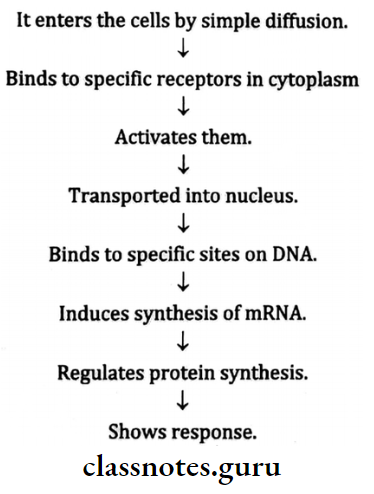
Glucocorticoids Uses:
1. Replacement therapy.
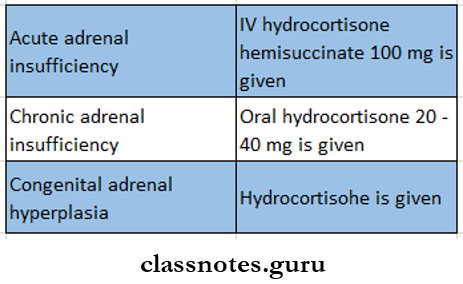
2. Pharmacotherapy.
- Arthritis
- Rheumatoid arthritis.
- Used along with NSAIDS
- Osteoarthritis.
- Used as intra-articular injections.
- Rheumatoid arthritis.
- Rheumatic carditis.
- Used in severely ill patients with fever.
- Acute gout
- Allergic diseases.
- Bronchial asthma.
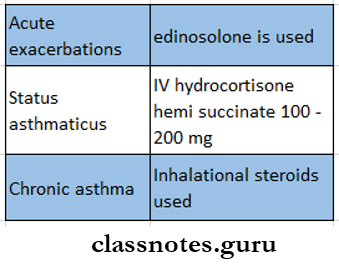
- Collagen diseases.
- Prednisolone was used for 6 weeks,
- Eye diseases.
- Renal diseases.
- Skin diseases.
- Gastrointestinal diseases.
- Liver diseases.
- Hematologic disorders.
- Cerebral edema.
- Large doses of dexamethasone are used.
- Malignancies
- Provide rapid symptomatic relief.
- Lung diseases
- Organ transplantation.
- Other uses:
- Sarcoidosis.
- Pneumocystis jirovici.
- Hemolytic anemia.
Glucocorticoids Adverse Effects:
- Cushing’s syndrome.
- Hyperglycaemia.
- Increased susceptibility to infections.
- Osteoporosis.
- Avascular necrosis.
- Peptic ulceration.
- Mental disturbances.
- Cataract, glaucoma.
- Delayed wound healing.
- H PA axis suppression.
- Mineralocorticoid effects:
- Salt and water retention
- Edema
- Weight gain
- Hypokalemia
- Hypertension.
Corticosteroids classification
Question 2. Enumerate synthetic corticosteroids. Mention their pharmacology, uses, and toxicity.
Answer:
Synthetic corticosteroids:
- They are more selective corticosteroids
- They are more potent than, natural ones.
- They do not have mineralocorticoid action
- They include.
1. Synthetic corticosteroids Prednisolone.
- Intermediate acting.
- Used for allergic, inflammatory, autoimmune diseases and malignancies.
- High doses cause fluid retention.
- Causes less HPA axis suppression.
2. Synthetic corticosteroids Methylprednisolone.
- More potent and more selective.
- 4 – 32 mg/day is given orally.
- Used in rheumatoid arthritis, renal transplant, and pemphigus.
3. Synthetic corticosteroids Triamcinolone.
- Highly selective
- Used 4 – 32 mg/day orally, 5 – 40 mg IM, as intra- articular injections as well as topically.
4. Synthetic corticosteroids Dexamethasone.
- Long action
- Used in
- Inflammatory conditions,
- Allergic conditions.
- Shock.
- Cerebral edema.
- Adverse effects
- Marked HPA suppression
- Less fluid retention and hypertension.
5. Synthetic corticosteroids Betamethasone.
- Similar to dexamethasone.
- Uses:
- Cerebral edema
- Use where fluid retention is required.
6. Synthetic corticosteroids Deflazacort
- Highly selective.
- Less potent
- Causes fewer adverse effects
Mechanism of action of corticosteroids
Question 3. Name adrenocorticosterolds.
Answer:
Adrenocorticosteroids:
•They are compounds created by the adrenal cortex that have distant metabolic effects.
•They include.
- Glucocorticoids
- Mineralocorticoids and
- Androgens.
Cortico Steroids Short Essays
Question 1. Difference between natural and synthetic glucocorticoids.
Answer:
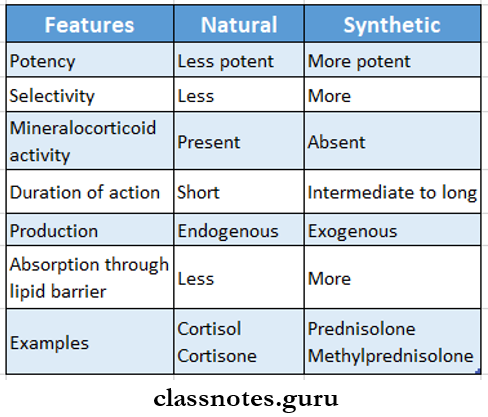
Question 2. Adverse effects of glucocorticoids.
(or)
Adverse effects of prednisolone.
Answer:
- Cushing’s syndrome.
- Characterized by a moon face, supraclavicular or hump, obesity of trunk, muscle wasting, thin limbs and skin, and easy brushing.
- Cutaneous atrophy, purple striae, acne.
- Hyperglycaemia, precipitation of diabetes mellitus.
- Increased susceptibility to infections. Opportunistic infections, due to immune suppression.
- Muscle weakness, myopathy occasionally.
- Osteoporosis, especially of vertebrae.
- Peptic ulceration on prolonged use.
- Avascular necrosis.
- Growth retardation in children due to prolonged use.
- Mental disturbances.
- With high doses of steroids.
- Delayed wound healing.
- Cataract and glaucoma – when used as eye drops.
- Foetal abnormalities.
- When administered during pregnancy, it causes cleft palate and other defects.
- HPA (Hypothalamo-pituitary adrenal) axis suppression.
- It is withdrawal syndrome.
- Causes reactivation of disease.
Corticosteroids short notes
Question 3. Explain why glucocorticoid therapy should not be stopped abruptly.
(or)
Abrupt cessation of prolonged administration of glucocorticoids is hazardous. Explain.
Answer:
After prolonged administration of glucocorticoids, it should be tapered before withdrawal.
- Sudden cessation may cause suppression of the hypothalamic-pituitary-adrenal axis suppression.
- This leads to.
- Precipitation of underlying disease.
- Reactivation of disease.
- Withdrawal symptoms like fever, myalgia, arthralgia, and malaise.
- Such patients may be subjected to stress and can go to acute adrenal insufficiency.
- Characterized by anorexia, nausea, vomiting, abdominal pain, hypotension, dehydration, and hyper-kalaemia.
- Any patient who has received more than 20 – 25 mg per day of hydrocortisone, needs tapering of the dose.
- If a patient has received long-term steroids within the previous six months, hydrocortisone is administered pro-prophylactically in such patients.
Cortico Steroids Short Question And Answer
Question 1. Adverse effects of glucocorticoids.
Answer:
glucocorticoids Adverse Effects:
- Cushing’s syndrome.
- Hyperglycaemia.
- Increased susceptibility to infections.
- Osteoporosis.
- Avascular necrosis.
- Peptic ulceration.
- Mental disturbances.
- Cataract, glaucoma.
- Delayed wound healing.
- H PA axis suppression.
- Mineralocorticoid effects:
- Salt and water retention
- Edema
- Weight gain
- Hypokalemia
- Hypertension.
Question 2. Prednisolone.
Answer:
Prednisolone is a synthetic glucocorticoid.
- It is more selective and four times more potent than hydrocortisone.
Prednisolone Uses:
- Allergic reactions.
- Inflammatory conditions.
- Autoimmune diseases.
- Malignancies.
Prednisolone Adverse Effects:
- Fluid retention in high doses
- Less HPA axis suppression.
Question 3. Betamethasone.
Answer:
Betamethasone is long acting glucocorticoid.
- It is potent and highly selective.
Betamethasone Uses:
- Cerebral edema.
- Inflammatory conditions.
- Allergic reactions.
- Shock.
Betamethasone Adverse Effects:
- Marked HPA axis suppression.
- But does not cause fluid retention.
Question 4. Hydrocortisone.
Answer:
Hydrocortisone is a short-acting corticosteroid.
- It may be natural or synthetic.
- It has mineralocorticoid activity.
- The normal rate of secretion – 10 mg/day.
Hydrocortisone Uses:
- Anti-inflammatory.
- Allergic reactions.
Hydrocortisone Disadvantages:
- Delays wound healing.
Corticosteroids uses and side effects
Question 5. Uses of glucocorticoids.
Answer:
glucocorticoids Use:
1. Endocrinal uses.
- Replacement therapy.
- Acute adrenal insufficiency.
- Chronic adrenal insufficiency.
- Congenital adrenal hyperplasia.
2. Non-endocrinal uses.
- Arthritis – rheumatoid arthritis, osteoarthritis, rheumatic fever, acute gout
- Allergic reactions.
- Bronchial asthma.
- Collagen diseases
- Eye diseases.
- Skin diseases.
- Renal diseases
- Liver diseases
- Lung diseases
- Gastrointestinal diseases.
- Cerebral edema.
- Organ transplantation.
- Malignancies
- Hematological disorders.
- Other – sarcoidosis, pneumocystis jiroveci, hemolytic anemia.
Question 6. Adrenocorticotropic hormone (ACTH).
Answer:
ACTH is a 39 amino acid single-chain peptide.
- It promotes steroidogenesis in the adrenal cortex by stimulating cAMP formation.
- Absence of ACTH results in adrenal atrophy.
- Hypothalamus regulates ACTH release from the pituitary.
- Excess production of ACTH causes Cushing’s syndrome.
ACTH Uses:
- Used primarily for the diagnosis of disorders of the pituitary-adrenal axis.
- When used IV, it increases plasma cortisol if the adrenals are functional.
- It serves as a diagnostic tool for differentiating between primary and secondary adrenal insufficiency.
Corticosteroids viva questions
Question 7. Difference between hydrocortisone and dexamethasone.
Answer:
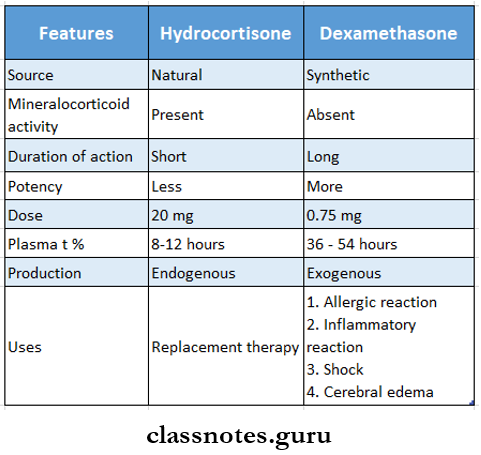
Question 8. Name four glucocorticoids.
Answer:
- Short-acting – cortisone, hydrocortisone.
- Intermediate acting.
- Prednisolone, methylprednisolone.
- Long-acting.
- Dexamethasone, betamethasone.
